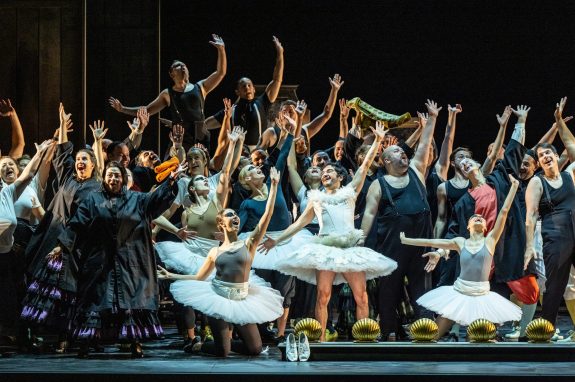 Switzerland Rameau, Platée: Soloists, Extras Association of Zurich Opera, Chorus of Zurich Opera, Orchestra La Scintilla Zurich / Emmanuelle Haïm (conductor). Zurich Opera, 10.12.2023. (MF)
Switzerland Rameau, Platée: Soloists, Extras Association of Zurich Opera, Chorus of Zurich Opera, Orchestra La Scintilla Zurich / Emmanuelle Haïm (conductor). Zurich Opera, 10.12.2023. (MF)

Jean-Philippe Rameau labelled his Platée a ballet bouffon. Conductor Emanuelle Haïm and director Jetske Mijnssen duly deliver on the promise. It is the French-Dutch duo’s second Zurich production, after their success in 2019 with the same composer’s earlier Hippolyte et Aricie.
Platée, sung by a tenor, is an unsightly water nymph who has convinced herself that all men must instantly fall for her, including Jupiter. She is convinced that even his instantly leaving any room she enters can be nothing but proof of his infatuation with her. Having bitten off more than she can chew, things do not end well for this nymph in search of love. The gods are playing a cruel game: Jupiter, cheered on by the lesser deities, gets involved with Platée for appearances only, and to appease his goddess wife Juno’s jealousy. With the supreme prize of divine nuptials seemingly within reach, our nymph collapses in disillusion and humiliation, mocked by all.
A good thing is that director Mijnssen opts for a kinder approach. She is very taken with the protagonist’s charming nature and shows us a teenager (illustrated by the fan posters hanging in her room) who is always falling in love but is never loved back. Unflinching, Platée stands by her desires, her right to love and eroticism. She is close to our hearts, an open person kindling our sympathy. But this opera is also a cruel comedy: the gods, muses and other characters mock Platée’s desires and her lust as haughty. A simple-minded creature, she is prepared to believe that the boss of all bosses would descend from his throne to marry her. She is deceived by the society of gods, shamed and scorned. Nonetheless, her sincerity is genuinely touching.
Although Rameau was over sixty when he wrote this opera, it sounds youthful, fresh, witty and modern. He experimented, wrote visionary music and even used quarter tones at one point. The rhythms vary constantly, the harmonies are refined and declamation is utterly flexible. Rameau applies infinite nuance to the translation of the various emotional levels into music. His score contains a great deal of black humour, irony and sometimes a touch of bitterness, too. Conductor Haïm, a renowned Rameau specialist who founded her own baroque ensemble over twenty years ago, feels that he never before, nor after, composed ‘such crazy music’.
Mijnssen and her production team (the elaborate set is by Ben Baur and imaginative costumes by Hannah Clark) conceive a theatre within a theatre scenario. The background story is the cast in preparation for a ballet performance. They rehearse Swan Lake. It is an apt choice of another piece set around water, whose protagonist longs for salvation through love – and ends unhappily. Mijnssen skilfully combines the singers with the eight strong ballet ensembles. Rather than separating the dancing from the singing, she chooses to merge the two, as various singers take up their secondary roles as dance master, budding ballerina (Platée) or star dancer (Jupiter). Also, Mijnssen places various references, among others ‘L’enfer c’est les autres’ in bold letters as a clue to Sartre’s Huis clos. It could all be cruelty, sadness and despair until Mijnssen pulls a theatrical rabbit out of her hat. As the orchestra plays the last bars, she has the lights come back on for a micro-epilogue: perhaps Jupiter duped everyone except Platée after all?
French tenor Matthias Vidal is a brilliantly comical and touchingly naïve Platée, a role which Rameau wrote for a haute-contre, at the time the primary French operatic tenor voice. Vidal rises to the challenge from Mijnssen. He dances (a tutu appearance not to be missed!), gets lost in boisterous infatuation and crashes in despair in the final tutti scene, mocked by all the wannabes around Jupiter. An entertaining yet deeply musical delight. Despite being at the plot’s centre, Jupiter (Evan Hughes) and his wife Juno (Katia Ledoux) have been confined by Rameau to rather smaller roles, which they play beautifully. Hughes is an imposing figure with an impressive physicality and Ledoux a powerfully jealous wife.

La Folie (Mary Bevan) is a Pina Bausch-like chain smoking dance master performing impressive coloratura while coaxing Platée into uncomfortable ballet positions. Tania Lorenzo’s L’Amour has a rousing entrance in glittery tails and top hat that would have made Liza Minnelli in Cabaret proud. These outstanding performances were completed by the strong ensemble, in particular Renato Dolcini as Satyre/Cithéron, Theo Hoffman as Momus and Anna El-Khashe as Clarine/Thalie. Not to mention the harmonious ensemble of dancers who achieve an impressive fusion with the cast of singers.
Emanuelle Haïm displays her French baroque expertise beautifully. She conducts the reliably brilliant La Scintilla orchestra. They play with zest and relish, bringing out rich colours and the exaggeration Rameau included in the score to illustrate the world’s mercilessness – but also the finer nuances reminding us that there is hope.
A fine and highly enjoyable evening at Zurich Opera ended in enthusiastic applause for the singers, the conductor, the orchestra and the production team.
Michael Fischer
Production:
Director – Jetske Mijnssen
Set – Ben Baur
Costumes – Hannah Clark
Lighting – Bernd Purkrabek
Choreography – Kinsun Chan
Choir – Janko Kastelic
Dramaturgy – Kathrin Brunner
Cast:
Platée – Mathias Vidal
Jupiter – Evan Hughes
Junon – Katia Ledoux
Satyre / Cithéron – Renato Dolcini
Thespis – Alasdair Kent
Mercure – Nathan Haller
La Folie – Mary Bevan
Momus – Theo Hoffman
Clarine / Thalie – Anna El-Khashe
Amour – Tania Lorenzo
First Maenad – Gloria Gottschalk
Second Maenad – Katarzyna Rzymska
Dancers – Dustin Eliot, Steven Forster, Sina Friedli, Federica Porleri, Valerio Porleri, Juliette Rahon, Valentina Rodenghi and Roberto Tallarigo
